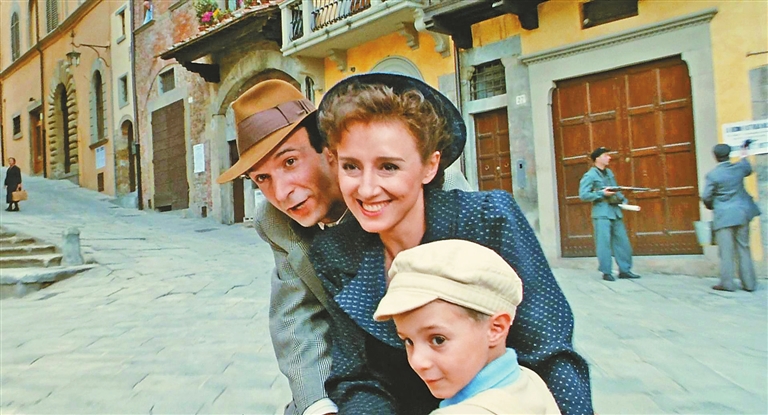
Roberto Benigni must have been the kind of kid whose parents dragged him out in the living room to sing and tap dance when the neighbors came over. He would have danced around and blabbered 100 miles a minute in a desperate attempt to impress them with his grandstanding humanism. Evidently it works for a lot of people. His 1997 movie, “Life Is Beautiful,” which is being screened on the Chinese mainland, has been wowing people around the world for more than 20 years. Written and directed by and starring himself, the film was a critical and financial success in the 1990s. It won the Grand Prix at the 1998 Cannes Film Festival, two European Film Awards and three Academy Awards, including Best Foreign Language Film and Best Actor. The story consists of two barely reconciled halves. In the late 1930s, Guido (Benigni) instantly falls for sweet, upper-class schoolteacher Dora. While charmed by her clownish suitor and his comical ruses to keep popping up in her path, Dora remains dutifully true to her fiance, a pompous town official. Learning of the impending marriage as he waits tables at their official engagement reception, Guido literally charges in to rescue her. The movie jumps ahead five years to wartime, when Guido and Dora are married with a son, Giosue. The boy’s questions about anti-Jewish sentiment are made light of by his father, until the pair are hauled off to a concentration camp. Not being of Jewish heritage, Dora is left behind, but she insists on boarding the train with her family. From the outset of the horrific ordeal, which lasts through the end of the war, Guido shields Giosue from the experience by cleverly incorporating everything from the barking Nazi guards, the squalid sleeping quarters and his tattooed prisoner number, to the shortage of food and the absence of Dora, into an elaborate game in which father and son compete with other “contestants” for points in the hope of winning an armored tank. Old people and children at the camp gradually are exterminated, forcing Guido to invent new rules about hiding in silence to save Giosue. Even while giving vent to his natural propensity for comic mugging, Benigni brings surprising depth and poignancy to the desperate father trying to mask his own fear and exhaustion and ensure that at least part of his family is reunited unharmed after the war. (SD-Agencies) | 
